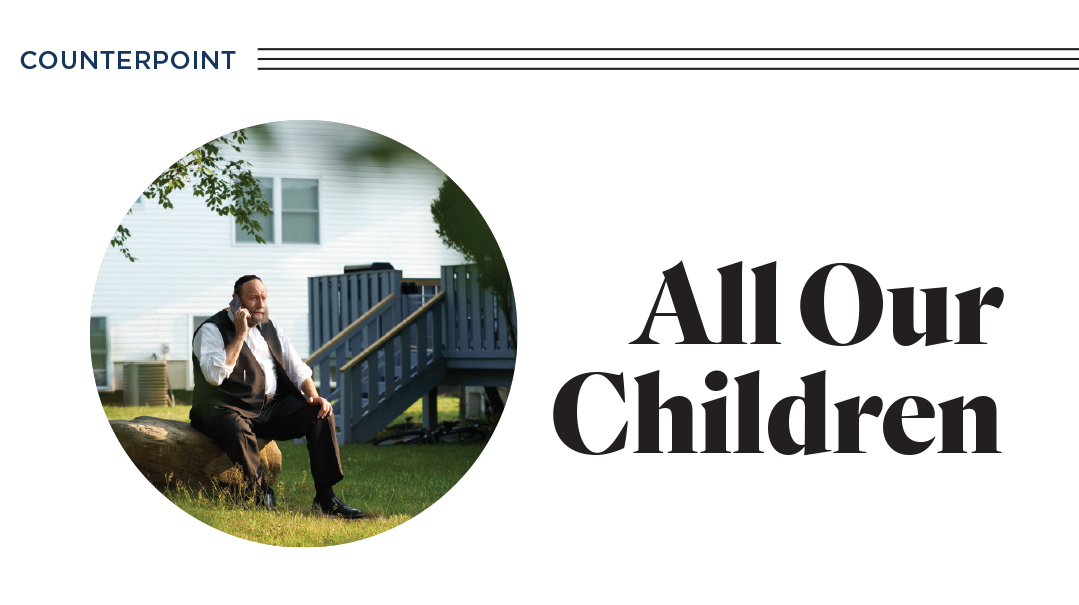Checks and Balances: Readers Respond, Part 1

Last week’s theme issue on the ben Torah in the workplace drew significant and sustained feedback. Below is a sampling
S
ense of Pride — Avraham Hershkowitz, Lakewood, NJ
At a time when the general tone and level of so-called chareidi journalism seems to be sinking, you offered hope.
Just two weeks ago, we were sitting with friends and bemoaning the frum media’s focus on rich people, singers, and politicians. Reading about cutthroat investors as they judge some poor guy trying to make a living is called entertainment.
Then along came your theme issue, and it restored a sense of pride in what we’re capable of. Not since the Jewish Observer have we seen such a collection — leading gedolim offering candid advice and insight, a sophisticated survey and analysis that could measure up to those conducted by secular media, and a strong message about our mission as a mamleches kohanim.
I was proud to be a Mishpacha subscriber. Please keep issues like this coming.
Unfair and Unrealistic — Chaim K.
Firstly, I’d like to commend Mishpacha for the special theme issue of Checks & Balances. The breadth of coverage from so many different angles made for a masterpiece.
As a husband who has gone through some of the challenges associated with the transition to the workplace, the only article that did not resonate well with me was “At His Side.” While the challenges many women face during this transition period were clearly articulated, the advice given in the article didn’t seem to be realistic.
Marriage is a partnership between two people who commit to a path reflecting the values they both share. When one partner deviates (even slightly by deciding to do things his wife is not comfortable with) from the agreed-upon road map they’ve been following up till that point (not specifically by going to work, as this is usually out of necessity, but what “comes with it,” detailed in some examples in the article), there needs to be accountability, transparency, and dialogue about how to get back on a path that works for both husband and wife.
To generalize that “the woman holds the keys to her husband’s ruchniyus” honestly isn’t a fair assessment of reality and definitely should not be used as general advice to the public. Obviously, a wife’s respect for her husband, no matter what his station in life, is paramount to building a good relationship, but it isn’t realistic or fair to translate that into “the burden and responsibility of the husband’s ruchniyus rests on the wife’s shoulders.”
A husband needs to take ownership of his decisions and the path he takes when going to work. He holds the keys to his own and by extension his family’s ruchniyus (as they are directly impacted by decisions he makes), and he is the one responsible to answer to his wife and family for his decisions.
Read It Too — A.L. from Washington Heights
Your recent issue focusing on the challenges and opportunities facing a ben Torah entering the workforce was timely and relevant. As Rav Lopiansky said, it is the issue. Thank you for bringing it to the forefront of the public consciousness in such a comprehensive way.
Rav Brudny was cited as saying that every family that transitions from kollel to working should own a copy of Rav Lopiansky’s Ben Torah for Life. Based on some of the other pieces in the issue, though, I was wondering if it wouldn’t be equally valuable for every family in kollel or klei kodesh to own a copy. If bnei Torah entering the workforce find that they are being marginalized by those still in learning, wouldn’t it be valuable for the latter to understand and appreciate the spiritual value of the struggle that working bnei Torah endure on a daily basis, as Rav Lopiansky so eloquently describes? And if many of those who succeed in the transition to working find that having a rebbi to consult with is critical, and especially to give him chizuk in the initial stages of the transition, wouldn’t it be beneficial for the rebbi also to have ready access to the many sources and ideas Rav Lopiansky cites?
In a related vein, you featured an excellent article on the difficulties wives experience when their husbands leave kollel. Perhaps husband and wife could read the book together in the period leading up to the transition out of kollel so they could share a common language and context for discussing challenges that inevitably will come up during the rocky period of transition.
To all bnei Torah in Klal Yisrael, working in the beis medrash or the office, keep up the good work!
When It’s Part of You — Akiva Dimy
I wish to congratulate Mishpacha magazine on last week’s theme issue Checks & Balances. Though I appreciated the multitudes of ideas, opinions, and perspectives, my personal highlight was a small subsection that described the Kinyan HaMasechta program. For myself and so many others, Kinyan HaMasechta has served as the single solution to practically all the issues raised throughout the magazine.
The program’s insistence on chazarah and on gaining absolute clarity on all material covered, instills a self-inspired motivation to hold on to your Gemara regardless of where you may be physically stationed. Rabbi Newman is fond of saying, “Rather than going through the Gemara, let the Gemara go through you!” And when the Gemara truly becomes a part of you, no one, and no place, can take it away.
The Kinyan HaMasechta siyumim are intentionally lavish, generously funded by the program’s management. This results in a directly, albeit silently, communicated message: Your Torah is important, more important than everything else going on in life. Kinyan HaMasechta members aren’t the only ones invited to these events, their families are encouraged to join as well — because Kinyan HaMasechta recognizes that kevod haTorah must be a household project.
I personally thank the organizers and maggidei shiurim of Kinyan HaMasechta for making my transition from kollel to the workplace as smooth and uneventful as possible. I’m sure that the hundreds of members of Kinyan HaMasechta throughout the world would agree with me as well.
Who’s a Ben Torah? — Dov Elefant
With much thanks to Mishpacha for this past issue discussing the life of a ben Torah in the working world, I would note what I believe to be a glaring omission. The premise of most of the dialogue was that the working bnei Torah are those who were in kollel and then left. The reality is that Torah belongs to every Jew, and everyone can have a kinyan in it and be a ben Torah.
Furthermore, to expand on Rav Hauer’s point, I would argue that all working men have to realize and appreciate that the main learning of their lives will be during their working years. It is wrong to allow the success or lack thereof in yeshivah or kollel to define the rest of their lives, for better or worse.
The one program that I have found uniquely suited to this is the Kinyan HaMasechta program of Rabbi Dovid Newman. It was featured as one of five options in the past issue, and from my perspective, its beauty and success at reaching balabatim of all levels, make it the perfect solution for balabatim facing the reality of very minimal time available to dedicate to learning.
In my chaburah, we spend 25 minutes a night, a manageable time for most people. With chazarah built into the program, those who may have struggled in the past now know the blatt inside out. And those who may have been able to learn on their own walk away with a clarity and knowledge that only chazarah can bring. No memorization necessary.
It is amazing to see the dedication and commitment of Yidden to a nightly seder when it is designed for them to be koneh their own cheilek in Torah.
A Revolution in the Making — Dr. Steven (Yoel) Stein, Passaic, NJ
Thanks so much for publishing an article on the amazing Daf HaShavua program, which had its humble beginnings in the Passaic community and is now spreading like wildfire throughout the Torah world. Even in my brother’s shul in Ramat Beit Shemesh, the program has taken hold and continues to grow with each new masechta.
As an avid participant for the last few years, I can proudly say that without this structured schedule, I never would have learned the 184 blatt that I baruch Hashem have accomplished so far. The good fortune of being in a shul (and community) in which there are so many people learning the same daf at the same time creates an energy and enthusiasm to not merely “keep up,” but to attain a level of mastery over the material. In addition, finding multiple chavrusas to fit into the open slots in my schedule is also relatively easy, given the large number of people participating.
I truly feel that we are witnessing a revolution in the making.
May the organizers and participants of this wonderful program continue to have hatzlachah!
The Proof Is in the Learning — Shmuel Ismach, Rabbi, Young Israel of Great Neck
Many have said that when it comes to any initiative, having a good idea is great, but the kuntz is in the execution. With this in mind, I applaud the efforts of the visionaries behind the Daf HaShavua program. The multiple resources they offer, the tests they administer, the technology they have integrated, and the energy they exude in every communication only add to the remarkable community of learners they have formed. The proof is in the learning, and I’ve seen few other programs target and successfully hit as many people as well as the Daf HaShavua initiative has.
My own shul has had multiple first-time mesayemim and is planning a large siyum for Maseches Megillah. Our only regret is that we didn’t find it sooner. We are truly grateful.
Sheli v’shelahem, shelachem.
Why Were We Omitted? — Hersh Leib Shapiro, Monsey
On behalf of the chassidishe community, I want to first say “Excuse me?” and then “Thank you!”
I read through your theme issue wondering if you’d purposely ignored a major segment of your readership, or if it was an oversight. We in the chassidish community don’t see kollel the same way as our litvish counterparts. The Satmar Rebbe ztz”l prided himself on the fact that he created true erliche balabatim, whether realtors or electricians, who saw their mandate the same way and didn’t fall apart after going to work.
I reached out to a Mishpacha editor wondering about the omission: Why no discussion of our way of life? He showed me the segments in Rav Lopiansky’s book where the Rosh Yeshivah clearly writes the benefits of the chassidishe approach, including the value of having a rebbe and belonging to a wider kehillah. I realized that we weren’t left out, but complimented — for what you were really saying was that we don’t face this challenge, at least not to the same extent as the litvish world.
Where Chassidim Get It Right — Suri Katz
Last week’s theme issue was fantastic. Even though we are chassidish and not all the issues were applicable, quite a few were universal to all families who start out in full-time learning. The main issues that don’t apply to chassidim are the second-class feeling that yeshivahleit experience when leaving kollel and the danger of exposure to secular workforces. In a funny way, these are connected.
The lack of secular education past the basic three Rs at a seventh- or eighth-grade level enables chassidim to start focusing exclusively on Torah learning at around bar mitzvah age. This gives them many years of serious learning before marriage is on the horizon.
The prevailing attitude among chassidim is that kollel after marriage will be temporary for most — because the women have to raise the children, and most cannot do that while serving as breadwinners in the long term. Additionally, there is the understanding, which the Baal Shem Tov and his students constantly stressed, that Hashem wants to be served many different kinds of “delicacies.” You can learn and be barely serving Hashem because you are doing it for social reasons, and you can wash the floors and be doing it totally for Hashem. Although not everyone does this, of course, the general understanding is to value a person according to his desires in life — does he want to daven, learn, do chesed? Is he a kind, caring, and scrupulous Jew?
As far as the dangers of the secular workplace, because chassidim have so little secular education, it is almost impossible for them to make it in all secular professional environments. But this does not seem to affect their ability to command an income. My husband’s company is owned by a chassid, his department is staffed by chassidishe men (one secular man was hired, treated nicely, but left because translated jokes just aren’t that funny). These men are also very assertive when they enter the workforce and get paid pretty decently pretty soon, even though their only education consists of local courses (many in Yiddish) designed for chassidim.
Different Schedules, Shared Values — Rochel Cohen
I salute the professional editors and writers for the comprehensive theme issue that kept me so fascinated. I read it all in one sitting. As a mother of sons and sons-in-law in America and Eretz Yisrael who excel in learning full time and have transitioned to the work force, these are my observations.
Those learning full time continue with a bren as the years go on and their families grow. In fact, the son with the best time-management skills is what you would describe as a top learner 15 years after the chasunah, learning from predawn kollel until after night seder. He is also a fantastic husband and father and he and his wife, who works full time, are equally content in their roles sharing the responsibilities of finances, child care, and the smooth running of their household. He manages to contribute to the household income with revenue from tenants and by being a very sought-after chavrusa during night seder for compensation.
A different son, whose family was growing past their budget, reluctantly reduced his learning to two sedorim and began attending a men’s-only professional training program four evenings a week. Yet his chavrusas in kollel did not find his tremendous kishron and hasmadah any different. Balancing kollel with schoolwork, chavrusas, and the responsibilities of a husband and father to a growing family took tremendous resilience — yet even now that he is working, his identity has not changed.
All my sons and sons-in-law scheduled their working hours around their sacrosanct learning, and when all the learners and workers sit at one table, there is no conspicuous disparity. The greatest sippuk I see from both my learning and working children is the gleam in their eyes during the Aseres Yemei Teshuvah, when most of them carve out time away from everything and return to a total atmosphere of V’hagisa bo yomam valailah, all sitting and learning together b’retzifus in one beis medrash. —
(Originally featured in Mishpacha, Issue 751)
Oops! We could not locate your form.





